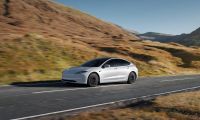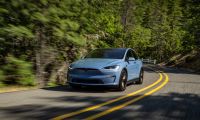Consumer Reports has just released the results of its owner survey looking at which brands owners report liking the most and least. Tesla tops the list for 2021. These most recent results are pulled from Consumer Reports' 2020 Annual Auto Surveys on 369,000 vehicles. Consumer reports says that data from the 2018 to 2020 model years (plus a few 2021 models) were used, as long as a vehicle wasn’t significantly changed over that time. An important part of the results lean on the "The Would Buy Again score". This is rolled up to a percentage of owners who responded “definitely yes” to the question of whether they would buy the same vehicle if they had the chance to buy again. If you received a vehicle survey from Consumer Reports and completed it, you helped to shape these results.
The overall satisfaction score by brand is broken down into five sub-segments for ease of comparison. They include Driving, Comfort, In-Car Electronics, Storage, and Value. Tesla's overall average score of 88 beats some well-known traditional brands by a massive margin. For example, Infiniti owners only rank their vehicles a 48 overall. Cadillac owners 59, and Mercedes Benz 64.
Related Story: Consumer Reports: Ford's Mustang Mach-E Tops Tesla Model Y In This Key Area
Tesla owners give their car a 5/5 with regard to Driving. However, those same Tesla owners rank their vehicles just 1/5 in Value. Lincoln, Ram, and Chrysler followed Tesla's top score. Toyota scored highest among manufacturers with double-digit models and among brands that offer a full line of vehicles (as opposed to just a few models like Tesla and Ram.)
You can view a summary of the results at Consumer Reports. Members of the subscription-funded publication can dig deep and see model and year level results.
John Goreham is a long-time New England Motor Press Association member and recovering engineer. Following his engineering program, John also completed a marketing program at Northeastern University and worked with automotive component manufacturers. In addition to Torque News, John's work has appeared in print in dozens of American newspapers and he provides reviews to many vehicle shopping sites. You can follow John on Twitter, and view his credentials at Linkedin
Set as google preferred source












Comments
The results of Tesla getting
Permalink
The results of Tesla getting top scores in almost all categories does not surprise me. But I would really like to see what the actual questions asked in the survey about value are. It is probably something actually related to purchase price, rather than actually long term value, or even relative value. Because used price values are higher for Tesla in general, operating costs are generally lower, and as mentioned over the air updates help Tesla retain their value longer. There is likely something tricky in the question that explains this anomaly in the results. Which is a key flaw in survey result analysis. Consumer Reports says "Value determines whether owners felt they got what they wanted relative to the purchase price." But considering that the majority of respondents of ALL brands show the same poor, 1/5 result in Value. It leaves the analysis suspect without better transparency to see the actual questions asked, and how they tally up the results.
Here is a story with no
Permalink
In reply to The results of Tesla getting by DeanMcManis (not verified)
Here is a story with no editorial opinion that shows Tesla as the top brand overall from owner surveys in the context of a publication that both recommends its products and provides outstanding drive report opinion stories. And the first comment underneath is that "This is a conspiracy."
There is a great book called
Permalink
There is a great book called How to Lie with Statistics. It is not so much a conspiracy, as a method of asking questions poorly to steer the result. From my look at their survey results, the majority of owners see the value of their new car purchase as being Poor, when 88% of the Tesla respondents say that they would buy the car again at the same price. At the simplest level this result does not make any sense. And in testing, when over half of test takers fail answering a particular question correctly, the problem is almost always that the question is written poorly or incorrectly. And it is the job of people giving surveys to fix bad questions. Or at least clearly explain why the results of the one question conflict with the results of several others.
Not sure why previous comment
Permalink
Not sure why previous comment finds fault with getting a top rating review.